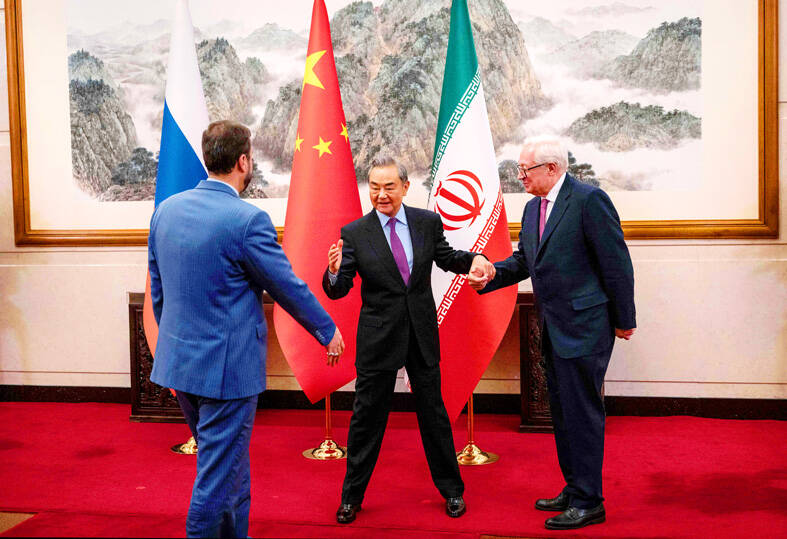China and Russia yesterday joined Iran in denouncing US sanctions, and backed efforts to restore a landmark nuclear deal with Tehran that US President Donald Trump abandoned in his first term and now wants to replace.
The three countries — all sanctioned by the US to varying degrees — stressed the need to end unilateral restrictions and urged the resumption of international talks over Iran’s atomic activities at a meeting in Beijing, a joint statement said.
Russia and China were key participants in the agreement signed during former US president Barack Obama’s administration that restricted Iran’s nuclear activity in exchange for sanctions relief, before Trump’s withdrawal in 2018.

Photo: AFP
As the standoff drags on, Iran has expanded its stocks of near-bomb grade enriched uranium, while Washington has toughened its sanctions.
Chinese Vice Minister of Foreign Affairs Ma Zhaoxu (馬朝旭) hosted yesterday’s meeting, which was also attended by Russian Deputy Minister of Foreign Affairs Sergei Ryabkov and his Iranian counterpart, Kazem Gharibabadi.
A separate meeting included Chinese Minister of Foreign Affairs Wang Yi (王毅).
“Political and diplomatic engagement and dialogue based on the principle of mutual respect remains the only viable and practical option,” Ma told reporters after the meeting.
Last week, Trump reiterated his interest in striking a new nuclear deal with Iran and warned the only alternative for the Islamic republic was to face military action.
The Beijing gathering follows a flurry of diplomatic activity on Iran’s nuclear program as world powers try to evade another crisis, at a time when wars in the Middle East and Ukraine are posing risks to energy prices and the global economy.
Iran has already had at least two rounds of preliminary nuclear talks with diplomats from the UK, France and Germany in Geneva in recent months. Trump also wrote a letter addressed to the Iranian leadership, which was received in Tehran on Wednesday via a top official from the United Arab Emirates.
The contents of the missive are not known and there has been no official response.
The participants in Beijing emphasized the need for all countries to abstain from actions that would undermine the inspection activities of the International Atomic Energy Agency monitors still working in Iran. The UN watchdog last month reported a surge in nuclear activity in Iran over the past few months.
“The situation has reached a critical juncture again. We must buy time for peace, resolve disputes through political and diplomatic means, and oppose the use of force and illegal sanctions,” Wang told reporters.

DAREDEVIL: Honnold said it had always been a dream of his to climb Taipei 101, while a Netflix producer said the skyscraper was ‘a real icon of this country’ US climber Alex Honnold yesterday took on Taiwan’s tallest building, becoming the first person to scale Taipei 101 without a rope, harness or safety net. Hundreds of spectators gathered at the base of the 101-story skyscraper to watch Honnold, 40, embark on his daredevil feat, which was also broadcast live on Netflix. Dressed in a red T-shirt and yellow custom-made climbing shoes, Honnold swiftly moved up the southeast face of the glass and steel building. At one point, he stepped onto a platform midway up to wave down at fans and onlookers who were taking photos. People watching from inside

MAKING WAVES: China’s maritime militia could become a nontraditional threat in war, clogging up shipping lanes to prevent US or Japanese intervention, a report said About 1,900 Chinese ships flying flags of convenience and fishing vessels that participated in China’s military exercises around Taiwan last month and in January last year have been listed for monitoring, Coast Guard Administration (CGA) Deputy Director-General Hsieh Ching-chin (謝慶欽) said yesterday. Following amendments to the Commercial Port Act (商港法) and the Law of Ships (船舶法) last month, the CGA can designate possible berthing areas or deny ports of call for vessels suspected of loitering around areas where undersea cables can be accessed, Oceans Affairs Council Minister Kuan Bi-ling (管碧玲) said. The list of suspected ships, originally 300, had risen to about

A Vietnamese migrant worker yesterday won NT$12 million (US$379,627) on a Lunar New Year scratch card in Kaohsiung as part of Taiwan Lottery Co’s (台灣彩券) “NT$12 Million Grand Fortune” (1200萬大吉利) game. The man was the first top-prize winner of the new game launched on Jan. 6 to mark the Lunar New Year. Three Vietnamese migrant workers visited a Taiwan Lottery shop on Xinyue Street in Kaohsiung’s Gangshan District (崗山), a store representative said. The player bought multiple tickets and, after winning nothing, held the final lottery ticket in one hand and rubbed the store’s statue of the Maitreya Buddha’s belly with the other,

Japan’s strategic alliance with the US would collapse if Tokyo were to turn away from a conflict in Taiwan, Japanese Prime Minister Sanae Takaichi said yesterday, but distanced herself from previous comments that suggested a possible military response in such an event. Takaichi expressed her latest views on a nationally broadcast TV program late on Monday, where an opposition party leader criticized her for igniting tensions with China with the earlier remarks. Ties between Japan and China have sunk to the worst level in years after Takaichi said in November that a hypothetical Chinese attack on Taiwan could bring about a Japanese